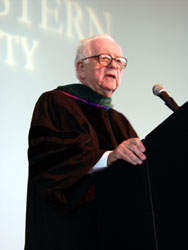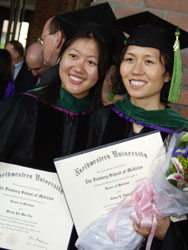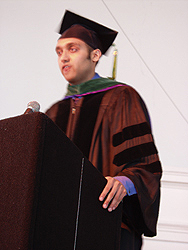Celebrating the Noble Traditions of Medicine
 The traditions and future promise of medicine were emphasized at the Feinberg School of Medicine’s Graduation Convocation on Friday, May 20. Held in Navy Pier’s Grand Ballroom, the ceremony honoring 168 members of the Class of 2005, drew more than 1,800 friends and family members.
The traditions and future promise of medicine were emphasized at the Feinberg School of Medicine’s Graduation Convocation on Friday, May 20. Held in Navy Pier’s Grand Ballroom, the ceremony honoring 168 members of the Class of 2005, drew more than 1,800 friends and family members.
As the crowd gathered, first-year students and keyboardists Lisa Jager and Sara Medendorp provided a selection of songs before the processional. Lawrence Takao of Honolulu, father of graduate Maura Takao, delivered the invocation.
Feinberg School Dean Lewis Landsberg, MD, commented that the physician’s professional authority rests on three pillars. This first is “knowledge and competence as validated by our peers.” “We are each responsible for not only what we do but also to ensure that others practice the art and science of medicine in an exemplary fashion,” he said. The second pillar of professionalism “is that medical knowledge is soundly grounded in science,” which entails an obligation to continuously advance the science of medicine and a commitment to lifelong learning.
The final foundation of medicine is altruism. “[This is] our primary obligation to use our knowledge and judgment to meet the needs of our patients,” Dean Landsberg said. “We exhaust every reasonable effort in providing appropriate care. We do this without regard for personal or financial gain and occasionally in the face of significant personal sacrifice and even physical risk. This is the very essence of our profession.”
Class of 2005 member and Student Senate President Benjamin Levi of Highland Park, Illinois, presented the Clinical Teacher of the Year Award to James J. Paparello, MD, instructor in medicine in the Division of Nephrology. The dean then introduced the keynote speaker, eminent cardiologist Eugene Braunwald, MD, Distinguished Hersey Professor of Medicine at Harvard Medical School, whose work across five decades “redefined cardiac physiology and pathophysiology.” Dean Landsberg, a former faculty member at Harvard, noted that Dr. Braunwald was his chair of medicine for a decade.
 Dr. Braunwald opened his address, “The MD Degree: A Passport to the Future,” by asking the graduates to “think of the MD degree from Northwestern University’s Feinberg School of Medicine—one of the country’s leading schools—not as a destination but rather as a professional passport.” This new professional passport “allows entry into the broadest array of interesting and gratifying activities.” While most new physicians will use the passport to provide “direct, hands-on” patient care, the possibilities for careers combining patient care with basic and clinical research, epidemiology, advocacy, and education and training are virtually limitless.
Dr. Braunwald opened his address, “The MD Degree: A Passport to the Future,” by asking the graduates to “think of the MD degree from Northwestern University’s Feinberg School of Medicine—one of the country’s leading schools—not as a destination but rather as a professional passport.” This new professional passport “allows entry into the broadest array of interesting and gratifying activities.” While most new physicians will use the passport to provide “direct, hands-on” patient care, the possibilities for careers combining patient care with basic and clinical research, epidemiology, advocacy, and education and training are virtually limitless.
Expanding on the concept of professionalism in medicine, Dr. Braunwald quoted Supreme Court Justice Louis Brandeis’ three criteria of a learned profession. First, “a profession possesses a specialized body of knowledge” that its members enhance and pass on to the next generation. Second, a “profession is responsible for setting its own standards and regulating itself.” Third, “a profession meets the needs of others above its own personal financial needs.”
In medicine, the first criterion means research and education. “These activities,” said Dr. Braunwald, “are like two intertwined chains that originated two-and-half thousand years ago at the dawn of our profession. The first links of these chains were forged by Hippocrates….You now have the responsibility to forge the next links.” That will include incorporating into their practices the clinical care advances arising out of research into genomics and teaching those who follow them into the profession.
Medicine is also responsible for setting its own standards and regulating itself, which will become a significant portion of  the new physicians’ lives. Said Dr. Braunwald, “You’ll be expected to give evidence of your continuing competence through mandatory education…as well as certification and re-certification by examination.”
the new physicians’ lives. Said Dr. Braunwald, “You’ll be expected to give evidence of your continuing competence through mandatory education…as well as certification and re-certification by examination.”
Dr. Braunwald noted that the third criterion for professionalism may be the most important. “In medicine, this deals with the fundamental social contract between you as a physician and your patient….The individual patient’s well being has to be your highest priority.” He reminded the graduates that all members of the health care team—nurses, nutritionists, psychologists, social workers, technicians, and therapists of many varieties—share the sincere desire to help patients. He compared the team members to the crew of a ship, whose skills and dedication are especially important when sailing rough seas. “However, just as on the ship the buck stops with only one person, the captain, so in medical care [it stops] with the physician,” he said. “Never forget your unique responsibility as the captain of the medical team.”
The ongoing financial crisis in the United States’ medical system results in restrictions of care. That creates a dual responsibility for physicians: taking care of patients without wasting limited resources. “Therefore,” said Dr. Braunwald, “it is incumbent on you to know the costs of the diagnostic procedures that you order and of the therapies that you prescribe or administer. But the other and much more fundamental obligation is your role as your patient’s principal and often only advocate. It is now my great pleasure to welcome you to the ancient, noble, caring, and learned profession of medicine.”
 The Class of 2005 selected Anand Shah, MD, of Glenview, Illinois, to deliver the senior class message. He quoted from Albert Schweitzer’s 1952 Nobel Peace Prize acceptance speech: “At times our own light goes out and is rekindled by a spark from another person. Each of us has cause to think with deep gratitude of those who have lighted the flame within us.” Dr. Shah said that his classmates, teachers, family, and friends have all been sources of that spark for him throughout the four years of medical school.
The Class of 2005 selected Anand Shah, MD, of Glenview, Illinois, to deliver the senior class message. He quoted from Albert Schweitzer’s 1952 Nobel Peace Prize acceptance speech: “At times our own light goes out and is rekindled by a spark from another person. Each of us has cause to think with deep gratitude of those who have lighted the flame within us.” Dr. Shah said that his classmates, teachers, family, and friends have all been sources of that spark for him throughout the four years of medical school.
Before the recitation of the Declaration of Geneva, Dr. Landsberg asked all physicians in the audience to stand and recite it with the Class of 2005 to reaffirm their commitment to the ideals of the profession of medicine. A reception for the graduates and their families and friends followed the recessional.






